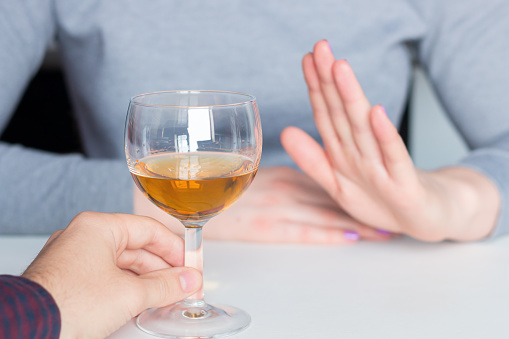The past few months have been full of holiday activities, from work events to those in our personal lives. We caught up with loved ones, we traveled to new places, and were able to socialize and have fun. If you are someone who enjoys socializing, you may find that the end of the year is your playground. There are countless events planned and excuses to get together with others. If you are more introverted, the past handful of weeks may have been a marathon for you. While all of the seasonal activities can bring you much-needed connection and adventure, they may have also led you to lose track of your alcohol use. This might be because you are having such a great time celebrating with everyone. It might be because you needed a little social lubrication to get through events with people you don’t know or multiple social occasions back to back. It might simply be because there was more alcohol available than you’re used to; you might adopt a “When in Rome” mentality for functions.
Dry January is a month of abstaining from alcohol, often adopted by people who feel that they have consumed enough (or more than enough) during the holiday season. If you’re coming out of
this season with the sense that you might want to take a break from drinking alcohol, you are not the only one. Many people do Dry January as a way to refresh their physical, emotional, and/or mental health. Maybe part of your new year’s personal goal is to take better care of your body. Maybe you have set another intention for which you want to be very clear-minded or wake up early to work on. You may be questioning your relationship with alcohol, especially if there is a history of substance use in your family. This might be the first year you’ve thought to partake in a sober month or one of many that you have either completed, considered, or attempted.
Who needs to try Dry January?
“How do I know if it is right for me?”

We are fortunate in that our bodies will tell us what they need. For example, waking up with a hangover is a strong clue that your body requires some care: rehydration, rest, food, etc. If you feel that the effects of drinking alcohol impede you physically the next day, you are noticing a negative result. If this negative result unsettles you, limits your ability to experience happiness or achieve your plans and goals, if you’re finding it too often for your own liking, it is a sign to examine your alcohol consumption.
If you are experiencing emotional turbulence related to drinking alcohol, such as high highs and low lows, irritability, irrationality, reckless decisions, fights with loved ones, issues with coworkers, the feeling of needing a drink to relax or feel comfortable, you might recognize that alcohol is having an impact on your emotional state and/or mental health.
During and following alcohol use, our inhibitions are lowered, which can lead to us making decisions we might not otherwise make. We can feel foggy and disoriented, less “sharp” than usual. This can impact us while we are drinking or trying to achieve something the following day. We may have difficulty remembering, planning, and deciding, all things that make it more difficult to function and find success in our daily endeavors.
“What are the benefits of Dry January?”
There are physical health benefits that can be felt in a month’s time; that is what makes it a reasonable time frame for this goal. It is short enough to agree to and long enough to see the

results of. Consider the potential for better sleep; more clarity; more energy; better mood. All of these have been linked to the reduction of alcohol consumption. Some studies have found links to a decrease in insulin resistance levels for those who gave up alcohol.
Dry January has been shown to improve many peoples’ overall relationship with alcohol and lead to a decrease in consumption over the remainder of the year. If you are someone who isn’t comfortable with your current relationship with drinking alcohol, Dry January can be a good reset. You might also view this as an experiment for curiosity’s sake, where you may or may not learn something new about yourself or discover that you’d like to make a change.
Financially, saving money from not buying alcohol can feel like a boost after what is typically an expensive couple of months. You may choose to give up alcohol with or without other non-necessity expenditures as part of a “budget challenge.”
Please note: if you are a long-time heavy alcohol user, a full Dry January may not be ideal for you or may require additional physical and mental health support. Some people in this category who attempt and/or complete Dry January rebound by drinking more alcohol than they did before Dry January. There are also medical risks to quitting alcohol cold turkey, depending on your alcohol habit. Please contact a medical professional to discuss your options for alcohol detox before attempting to reduce or eliminate alcohol. You may be in the clear to participate, but you may not be. Look out for yourself and set yourself up to be safe first and foremost.
3 Ways to Successfully do Dry January
1) Identify your triggers:

When we work with our clients on recovery from alcohol, drugs, or other abusive behaviors such as gambling, one of the most important tools we teach them is to identify their triggers. In classical conditioning, the trigger is a neutral stimulus that has been associated with a specific behavior; therefore, in time, this neutral stimulus becomes a conditioned stimulus that triggers the urge to engage in the behavior. For example, if you find yourself having a drink every week on the same day, such as Friday night at 7 p.m. with dinner, then the first Friday in January around dinner time, you will feel strong urges to drink. Specific types of alcohol may trigger you, certain dates or events, or places you go.
Sometimes, certain people are triggers. Perhaps they model alcohol consumption and invite and/or entice you to partake. Perhaps they are someone with whom you used to drink regularly, and even if that’s not the focus of your get-togethers anymore, the memories are still strong. Identify which social situations often include alcohol or cause you to feel the urge to drink alcohol. This doesn’t mean that this person or these people are bad people or that you can’t ever see them again. It is awareness that is important. Making a note of these people may be used solely as a reference list of people to advise that you are doing Dry January. Depending on their response to your plan, you may proceed to see them as usual, or you may take a step back and surround yourself with supportive folks. The choice will be up to you and depend on the circumstances at the time.
Aside from people, places, or things that can trigger you, we also strongly recommend that you be mindful of the emotional state(s) that has/have been linked to alcohol use. While you may have had a drink when feeling overwhelmed, exhausted, or anxious, please know that people are just as likely to turn to alcohol when feeling positive emotions such as happiness or excitement. Whether you reach for alcohol when you are happy, sad, stressed, anxious, or any or all combination of those feelings, be aware that it is the heightening of your emotions that compels you.
2) Visualize yourself without drinking:
Visualization is a tool we utilize here at our therapy practice in Woodland Hills. Even if you are only going to be sober for one month, any change can feel awkward and confusing. We, as humans, appreciate a

certain amount of predictability. To set yourself up for success, we recommend you plan ahead and start thinking about how your life will look without alcohol. Even if you think, “I don’t have a problem with drinking; I am just doing this to take care of my body; it won’t be a big deal,” take time to think about how you will say no to alcohol in social situations. Do you want to let others know so they don’t even serve you or ask you to have a drink with them? Do you prefer to let them know in advance or to do it at the moment? Can you imagine attending the same regular meet-up where everyone has a drink if you intend to stay sober? Do your best to picture it and plan how it will look.
When planning and visualizing, take the time to decide what you will drink instead. There are a plethora of non-alcoholic cocktail recipes online, as well as alcohol-free beers to try. You may also want to decide to increase your water consumption during this time, which is also something simple you can say to decline drinks at social gatherings. “I am rehydrating this month, water-only!” Or you might want to bring iced tea, soda, kombucha, or any other pre-bottled beverage with you where you go. Whatever you choose, plan it in advance and make it part of your visualization.
Also, consider how you could spend your time now that you will be alcohol-free for a month. Visualizing yourself without drinking doesn’t only mean visualizing tempting scenarios. It means planning for yourself what you can do instead! Maybe you want to go to your favorite yoga class or catch a movie rather than meeting up with friends for happy hour. Finding alternatives to drinking can give you a chance to re-commit to things that bring you more fulfillment. You may determine that these substitutions line up better with the kind of life you want to lead and see a lasting change after January, or you may have an adventurous January of switching up your schedule and trying new things.
3) Try “dryish” January:

You may feel overwhelmed about committing to Dry January. For some, the idea of not having social drinks for a month seems like “too much.” You may have a schedule that you feel is setting you up to “fail” Dry January if you know that you have some special occasions coming up that will involve a drink or two. That’s okay – goals for self-improvement and self-reflection are not one-size-fits-all. Instead of committing to a whole dry month, you can consider reducing your alcohol use. Taking small actions is still valuable and important. It does not have to be all-or-nothing to be beneficial and/or educational. As long as you are determining for yourself what your needs are, you are on the right track.
If you are someone who has a drink after work every day, you may want to decide that you’ll have a drink with dinner on weekends instead. Or you might want to figure out your average weekly alcohol consumption and eliminate it in some way, cutting it in half or reducing it to some other fraction. That might offer more flexibility for social engagements or other plans.
Plan what you can do to supplement your plan. For example, if you are going to reduce the amount of weekly alcohol you drink, plan what you will drink instead. Or if you are invited to two events where alcohol will be served, determine if one of them will be relatively easy to skip drinking at. Find opportunities that work for you, and create motivation to stick to it. If a local hiking group meets on Saturday mornings, that’s a great excuse not to have anything to drink on Friday night. Be flexible with yourself while staying focused on your reasoning for reducing your alcohol intake.
You can learn a lot about yourself by changing your habits. Some elements of our lives aren’t negotiable: we require rest, hydration, and nutrition to stay alive. We can positively impact our quality
of life by moving our bodies in ways that work for us, seeking self-care through mental wellness (in whatever ways we have access to), choosing our social circle conscientiously, and participating in activities we enjoy. Variables that aren’t necessary to stay alive but can become regular habits, such as drinking alcohol, may impact our lives a little, a lot, or not at all. Setting aside time to put a “disposable habit” on the back burner and seeing what impact that has on your life may feel like a big undertaking or a small one. It may lead to permanent change, temporary change, or no change. It might inspire you to switch up other behaviors or habits; it might give you a better insight into yourself or a loved one. It may turn out that it was a nice reset for yourself and an invigorating way to start your new year. However Dry (or Dryish) January impacts you, keep tabs on your self-discoveries and seek support where you need it.
Embracing You Therapy Can Help You Address Substance Use Issues
Here at Embracing You Therapy Group, we invite you to explore your relationship with addictive behaviors, whether that is a substance or an activity, and discuss with us how life would be different if you had more control over your unhealthy behaviors. We invite you to consider that it is possible to make changes in your life, get a hold of your destructive behaviors, and find the right tools to feel calm in your life.
If you haven’t entirely been successful with maneuvering your way through substance use issues, reach out to us to learn more about how therapy for addiction recovery can help you . Contact us today for your complimentary 20-minute phone consultation with our Client Care Coordinator.





